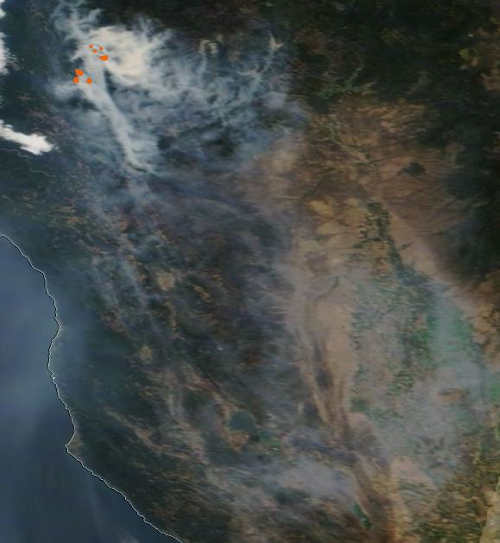
LAKE COUNTY, Calif. — The Lake County Air Quality Management District said air quality in the county will continue to be impacted until later this week due to fires to the north.
Smoke impacts to Lake County, which began over the weekend, are from the Six Rivers Lightning Complex fire and other minor regional fires throughout Northern California, the district reported.
The Six Rivers Complex, currently made up of three individual wildfires having burned 19,272 acres and 17% containment.
The Air Quality Management District said air monitor readings throughout Lake County on Monday showed “moderate” air quality levels.
All areas of Lake County have experienced moderate to unhealthy air quality on Monday. However, the air quality forecast through Thursday will range from “moderate” (AQI of 51-100) to “unhealthy for sensitive groups” (AQI of 101-151), and intermittently areas may experience “unhealthy” air quality for all.
Areas at lower elevations expected to experience the most smoke impacts in the morning hours, with higher elevations likely to experience impacts throughout the day. Expect fluctuating periods of poorer air quality.
Late this week, forecasts indicate a chance of improving conditions. This district said this smoke forecast is based on the latest weather, monitoring, fire activity information and will be updated as necessary.
The district is actively monitoring the smoke impacts throughout the county. Additionally, you may go to www.lcaqmd.net and follow the quick links for air monitoring for current smoke and air quality conditions.
Concentrations of smoke may vary depending upon location, weather, elevation, and time of day. Smoke from wildfires and structure fires contain harmful chemicals that can affect your health. Smoke can cause eye and throat irritation, coughing, and difficulty breathing.
People who are at greatest risk of experiencing symptoms due to smoke include: those with respiratory disease (such as asthma), those with heart disease, young children, and older adults.
These sensitive populations should stay indoors and avoid prolonged activity. All others should limit prolonged or heavy activity and time spent outdoors. Even healthy adults can be affected by smoke. Seek medical help if you have symptoms that worsen or become severe.
Follow these general precautions to protect your health during a smoke event:
• Minimize or stop outdoor activities, especially exercise.
• Stay indoors with windows and doors closed as much as possible.
• Do not run fans that bring smoky outdoor air inside — examples include swamp coolers, whole-house fans, and fresh air ventilation systems.
• Run your air conditioner only if it does not bring smoke in from the outdoors.
• Change the standard air conditioner filter to a medium or high efficiency filter. IF available, use the “recirculate” or “recycle” setting on the unit.
• Do not smoke, fry food, or do other things that will create indoor air pollution.
If you have lung disease (including asthma) or heart disease, closely monitor your health and contact your doctor if you have symptoms that worsen. Consider leaving the area until smoke conditions improve if you have repeated coughing, shortness of breath, difficulty breathing, wheezing, chest tightness or pain, palpitations, nausea, unusual fatigue and lightheadedness.
Localized areas of unhealthy air quality are possible throughout this fire season. Take appropriate measures whenever smoke is present.

 How to resolve AdBlock issue?
How to resolve AdBlock issue? 





